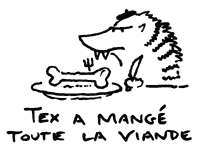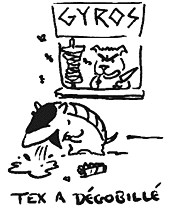Tense / Aspect / Mood / Voice
Passé composé with avoir
uses
The passé composé is the most commonly used tense to refer to actions completed in the past. The passé composé may be translated into English in three different ways depending on the context.
| Tex a mangé toute la viande! | Tex ate all the meat!
Tex has eaten all the meat! Tex did eat all the meat! |

formation
This tense is called the passé composé because it is composed of two elements: the present tense of an auxiliary verb (either avoir or être), followed by a past participle:
passé composé = present tense of auxiliary + past participle
Note that in most instances the auxiliary verb is avoir, but some verbs require être as the auxiliary.
For regular verbs with an infinitive ending in -er, the past participle is formed by replacing the final -er of the infinitive with -é. Listen carefully to the pronunciation of the passé composé of the verb ‘parler’. The past participle (parlé) is pronounced the same as the infinitive (parler), even though they are spelled differently.
| parler ‘to talk’ | |
| j’ai parlé I (have) talked |
nous avons parlé we (have) talked |
| tu as parlé you (have) talked |
vous avez parlé you (have) talked |
| il, elle / on a parlé he, she (it) / one (has) talked |
ils / elles ont parlé they (have) talked |
The past participle of regular verbs with an infinitive ending in -ir is formed by dropping the final -r from the infinitive. For example, the past participle of finir is fini.
| finir ‘to finish’ | |
| j’ai fini I (have) finished |
nous avons fini we (have) finished |
| tu as fini you (have) finished |
vous avez fini you (have) finished |
| il, elle / on a fini he, she (it) / one (has) finished |
ils / elles ont fini they (have) finished |
The past participle of regular verbs with an infinitive ending in -re is formed by replacing the final -re of the infinitive with -u. For example, the past participle of perdre is perdu.
| perdre ‘to lose’ | |
| j’ai perdu I (have) lost |
nous avons perdu we (have) lost |
| tu as perdu you (have) lost |
vous avez perdu you (have) lost |
| il,elle / on a perdu he, she (it) / one (has) lost |
ils / elles ont perdu they (have) lost |
Note that many verbs, however, have irregular past participles. The past participles of many common irregular verbs which have avoir as an auxiliary are listed below.
| infinitive | translation | past participle |
| avoir | to have | eu |
| être | to be | été |
| faire | to do | fait |
| ouvrir | to open | ouvert |
| prendre | to take | pris |
| mettre | to put | mis |
| suivre | to follow | suivi |
| boire | to drink | bu |
| croire | to believe | cru |
| voir | to see | vu |
| savoir | to know | su |
| connaître | to know | connu |
| dire | to say | dit |
| lire | to read | lu |
| écrire | to write | écrit |
| pouvoir | to be able to | pu |
| vouloir | to want | voulu |
| devoir | to have to | dû |
| tenir | to hold | tenu |
| recevoir | to receive | reçu |
negation
Negation of the passé composé is formed by placing ne … pas around the conjugated verb, which, in this case, is the auxiliary avoir.
| Oh, regardez! Tex a mangé toute la viande! Tammy, au contraire, n‘a pas mangé de viande! Elle est végétarienne, comme la plupart des tatous. | Oh, look! Tex ate all the meat! Tammy, on the other hand, did not eat any meat! She is a vegetarian, like most armadillos. |
Listen to the following dialogue:
| Joe-Bob arrive chez Tammy. Il meurt de faim. Mais il est trop tard. | Joe-Bob arrives at Tammy’s house. He is dying of hunger. But it is too late. | |
| Joe-Bob: Tammy, j’ai perdu ma collection de noix. Est-ce que je peux dîner avec vous? | Joe-Bob: Tammy, I lost my nut collection. Can I have dinner with y’all? | |
| Tammy: Je suis désolée, Joe-Bob. Tex a fini toute la viande. A mon avis, il a trop mangé. | Tammy: I am sorry Joe-Bob. Tex finished all the meat. In my opinion, he ate too much. | |
| Joe-Bob: Ce n’est pas grave Tammy. Je peux trouver quelque chose dans la cuisine … Mon dieu, Tammy! Est-ce que tu as vu? Tex a dégobillé partout. C’est dégueulasse! | Joe-Bob: It’s okay Tammy. I can find something in the kitchen … My god, Tammy! Have you seen? Tex threw up everywhere. It’s disgusting! | |
| Tammy: Ça ne m’étonne pas. Ce petit tatou carnivore, il n’est pas aussi évolué que moi! | Tammy: That doesn’t surprise me. That little carnivorous armadillo. He is not as enlightened as I am! |


